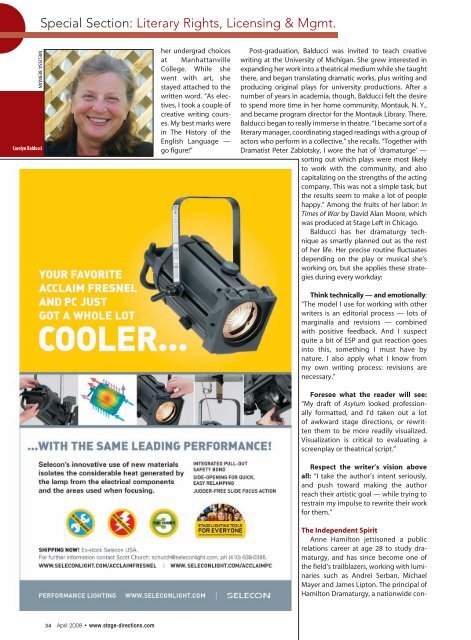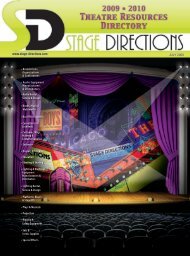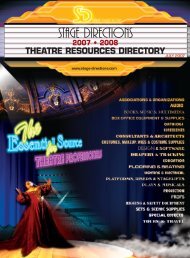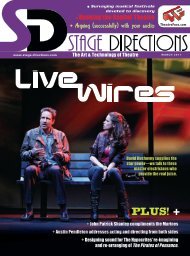Download a PDF - Stage Directions Magazine
Download a PDF - Stage Directions Magazine
Download a PDF - Stage Directions Magazine
You also want an ePaper? Increase the reach of your titles
YUMPU automatically turns print PDFs into web optimized ePapers that Google loves.
Special Section: Literary Rights, Licensing & Mgmt.<br />
Melissa Berman<br />
Carolyn Balducci<br />
her undergrad choices<br />
at Manhattanville<br />
College. While she<br />
went with art, she<br />
stayed attached to the<br />
written word. “As electives,<br />
I took a couple of<br />
creative writing courses.<br />
My best marks were<br />
in The History of the<br />
English Language —<br />
go figure!”<br />
Post-graduation, Balducci was invited to teach creative<br />
writing at the University of Michigan. She grew interested in<br />
expanding her work into a theatrical medium while she taught<br />
there, and began translating dramatic works, plus writing and<br />
producing original plays for university productions. After a<br />
number of years in academia, though, Balducci felt the desire<br />
to spend more time in her home community, Montauk, N. Y.,<br />
and became program director for the Montauk Library. There,<br />
Balducci began to really immerse in theatre. “I became sort of a<br />
literary manager, coordinating staged readings with a group of<br />
actors who perform in a collective,” she recalls. “Together with<br />
Dramatist Peter Zablotsky, I wore the hat of ‘dramaturge’ —<br />
sorting out which plays were most likely<br />
to work with the community, and also<br />
capitalizing on the strengths of the acting<br />
company. This was not a simple task, but<br />
the results seem to make a lot of people<br />
happy.” Among the fruits of her labor: In<br />
Times of War by David Alan Moore, which<br />
was produced at <strong>Stage</strong> Left in Chicago.<br />
Balducci has her dramaturgy technique<br />
as smartly planned out as the rest<br />
of her life. Her precise routine fluctuates<br />
depending on the play or musical she’s<br />
working on, but she applies these strategies<br />
during every workday:<br />
Think technically — and emotionally:<br />
“The model I use for working with other<br />
writers is an editorial process — lots of<br />
marginalia and revisions — combined<br />
with positive feedback. And I suspect<br />
quite a bit of ESP and gut reaction goes<br />
into this, something I must have by<br />
nature. I also apply what I know from<br />
my own writing process: revisions are<br />
necessary.”<br />
Foresee what the reader will see:<br />
“My draft of Asylum looked professionally<br />
formatted, and I’d taken out a lot<br />
of awkward stage directions, or rewritten<br />
them to be more readily visualized.<br />
Visualization is critical to evaluating a<br />
screenplay or theatrical script.”<br />
Respect the writer’s vision above<br />
all: “I take the author’s intent seriously,<br />
and push toward making the author<br />
reach their artistic goal — while trying to<br />
restrain my impulse to rewrite their work<br />
for them.”<br />
The Independent Spirit<br />
Anne Hamilton jettisoned a public<br />
relations career at age 28 to study dramaturgy,<br />
and has since become one of<br />
the field’s trailblazers, working with luminaries<br />
such as Andrei Serban, Michael<br />
Mayer and James Lipton. The principal of<br />
Hamilton Dramaturgy, a nationwide con-<br />
34 April 2008 • www.stage-directions.com

















